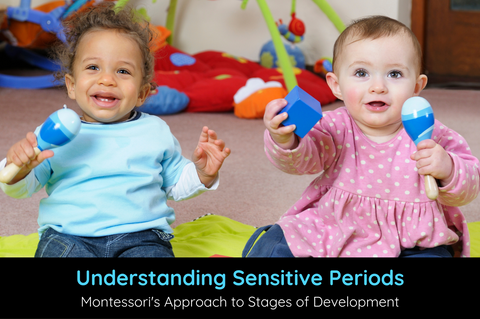Understanding Sensitive Periods: Montessori's Approach to Stages of Development
Understanding Sensitive Periods

DISCLAIMER: AS AN AMAZON ASSOCIATE I EARN FROM QUALIFYING PURCHASES MADE THROUGH LINKS BELOW.
A term first coined by Dutch geneticist Hugo de Vries, and later used by Dr. Maria Montessori, a sensitive period is a phase of childhood during which:
“The child has a creative aptitude, a potential energy that will enable it to build up a mental world from the world about it. He makes numerous acquisitions during the sensitive periods, which put him in relation to the other world in an exceptionally intense manner.” - The Secret of Childhood
We can think of "sensitive periods" as "developmental milestones" or "stages of development", as they are commonly referred to in other pedagogies. Regardless of what we call them, they are in essence, short snippets of time during which a child is uniquely excited about and equipped to learn certain thing in their environment:
"During each of these time frames, varying in duration from months to years, the child is so focused on the particular development that he will ignore other phenomena previously of great interest to him. His energy level and dedication to his single-minded task are extraordinary but terminate just as abruptly as they began. Montessori called these intervals Sensitive Periods." - Montessori from the Start
Sensitive periods are especially important during the unconscious first plane of development (ages 0-3) because it gives parents and teachers a way to help kids learn and grow:
"When parents and teachers recognize and take advantage of the sensitive periods through which children pass, they can become more effective in supporting their learning and development." - How to Raise an Amazing Child the Montessori Way.
When we say “follow the child,” we are referring to observing what sensitive period the child is experiencing, and presenting materials in the environment which will complement his natural learning. A lack of understanding of these sensitive periods can create challenges for children later in life, because once gone, the ease of learning afforded by these sensitive periods is lost.
Sensitive periods can last days, months or even years. Montessori noted that a few key behaviors are the hallmarks of these sensitive periods:
1. Structured activity with a beginning, middle & end,
2. Strong desire to engage in the activity,
3. Repetition of activity,
4. Emotional attachment to the activity, and
5. Satisfaction upon completion of activity.
Keep an eye out for these behaviors to help you determine when your child is in a sensitive period. According to Montessori, there are 11 sensitive periods which occur during the first plane of development (ages 0-6).
- Movement - Focused on developing coordination and control of movement: grasping, balancing, crawling, turning and walking. (Birth to age 1)
- Language - Focused on developing the use of words to communicate: crying, babbling, use of words and phrases, and finally use of sentences. Vocabulary and comprehension blossom more and more each year. (Birth - Age six)
- Small Objects - Focused on developing the physical use of small things and details. (Age 1 - 4)
- Order - Focused on organizing and sorting the environment via a need for consistency, familiarity, reliable routines and repetition (Age 2 - 4)
- Music - Focused on developing pitch, rhythm, and melody. (Age 2 - 6)
- Grace & Courtesy - Focused on internalizing grace & courtesy (cultural) norms: imitation of polite and considerate behavior. (Age 2 - 6)
- Refinement of the Senses - Focused on improving and fine tuning the ability to use the 5 senses. (Age 2 - 6)
- Writing - Focused on learning to write letters and numbers. Montessori discovered that writing precedes reading. (Age 3 - 4)
- Reading - Focused on learning letter sounds and using letters to form words. (Age 3 - 5)
- Spatial Relationships - Focused on understanding relationships in space, including the layout of familiar places: maps, puzzles, etc... (Age 4 - 6)
- Mathematics - Focused on understanding quantity and operations. (Age 4 - 6)
Dr. Montessori called these developmental milestones (or stages) the MOST important sensitive periods of childhood. As you observe your child on a day-to-day basis, keep these in mind so that you can proactively nurture your youngster as the opportunity arises. And, if you're a Montessori homeschooler, be sure to organize your Montessori homeschool curriculum so that you can capitalize on your child's sensitive periods.




